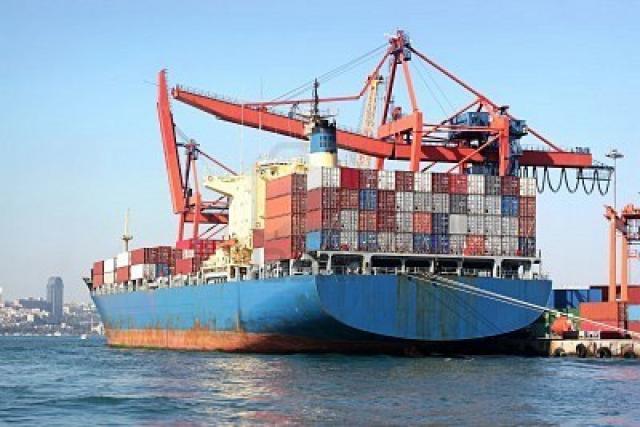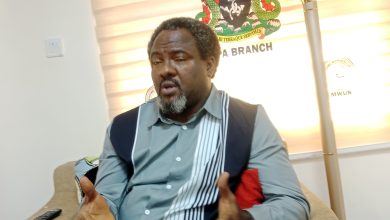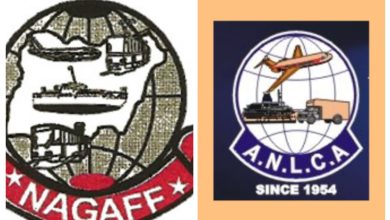3rd Compliance Roundtable Communique on Consolidating the gains of Maritime sector reforms (Full text).
3rd Compliance Roundtable Communique on Consolidating the gains of Maritime sector reforms (Full text).

On May 3rd, 2023, the Federal Ministry of Transportation (FMoT) in collaboration with the Maritime Anti-Corruption Network (MACN) and The Convention on Business Integrity (CBi) convened the third Compliance Roundtable at Providence by Mantis Hotel, Ikeja, Lagos. The Roundtable deliberated on the theme – “Maritime Sector Reforms: Consolidating the Gains.”
Carrying on the tradition established during previous Roundtables, after select keynote addresses, the event provided an opportunity for each attending agency to deliver a presentation on the state of their compliance frameworks.
The Roundtable was attended by 14 government agencies, private sector representatives, and other associations. Public agencies in attendance included the Independent Corrupt Practices and Other Related Offences Commission (ICPC), the Technical Unit on Governance and Anti-Corruption Reforms (TUGAR), Nigerian Ports Authority (NPA), Nigerian Shippers’ Council (NSC), the Port Standing Task Team (PSTT), Nigeria Customs Service (NCS), Nigeria Immigrations Service (NIS), Nigeria Agricultural Quarantine Service (NAQS), National Agency for Food & Drug Administration and Control (NAFDAC), National Association of Government Approved Freight Forwarders (NAGAFF), Association of Maritime Truck Owners (AMATO), and the Association of Nigeria Licensed Customs Agent (ANCLA).
After a welcome and National Anthem, led by Mrs. Cynthia Akpomudiare, the Chief Executive Officer of CBi, Mr. Soji Apampa, set the tone for the session. While he acknowledged that challenges remain in the sector, listing as examples challenges to infrastructure, the uneven reforms across various regions in Nigeria, the burden of checkpoints along the port corridors and transport routes across the country, the need for attention on the land-side and intermodal challenges that cause issues for truck drivers and owners alike, Mr. Apampa stated the focus of the day would be examining “what is working,” and asking attendees “how [can we] ensure that what is working permeates everywhere?”
Taking to the podium, Mr. Vivek Menon, Associate Director of MACN reflected on progress in the sector.
He shared that Nigeria’s reforms have captured global attention – and have global implications – and yet, Nigeria remains unique in the degree of dedication from the public and private sectors alike. This dedication has yielded several accomplishments, including the creation of the Nigerian Port Process Manual (NPPM), the publishing of Standard Operating Procedures (SOPs), the establishment of the Port Standing Task Team (PSTT), the operationalization of the Port Service Support Portal (PSSP), and a burgeoning, industry-wide compliance framework.
Mr. Menon also encouraged attendees not to dismiss gains such as the increased use of the Grievance Reporting Mechanism, and increased confidence that the private sector has in engaging the public sector directly when they encounter challenges. “These conversations,” Mr. Menon said, turning to the importance of institutionalizing a compliance framework, “have acted as a catalyst for achieving efficiency and quality service delivery.” They also point the way to reliability and efficiency, which will empower Nigeria to recoup opportunity losses and ensure the safety of all those involved in Nigeria’s maritime industry.
On her part, the Director of the Technical Unit on Governance and Anti-Corruption Reforms (TUGAR), Mrs. Jane Onwumere, represented by Mrs Bose Oguntuberu, a senior official of the institution, reflected on the role of the Port Steering Committee (PSC), setup by the FMoT to oversee, report, and promote the port reform agenda, in pushing forward efforts to strengthen the compliance function within port agencies.
She acknowledged the gains made in improving compliance through the introduction of the harmonised Standard Operating Procedures, Port Service Support Portal (PSSP), the Nigerian Port Process Manual (NPPM) and the Grievance Reporting Mechanism – HelpDesk, setup by MACN/CBi, all of which mark a critical starting point in the journey towards compliance at the ports. In addition, she explained that the visible impact of the successes of the Port Standing Task Team (PSTT) is another key achievement.
Mrs Oguntuberu informed the meeting that compliance is the key catalyst to the ease of doing business in the maritime sector and therefore must remain central to all considerations on port reforms to achieve efficiency and promote anti-corruption. She therefore pledged the support of TUGAR to continue to interface with compliance desk officers from the port agencies on the PSC to ensure the delivery of the integrity plan as envisaged, improve SOPs to capture recent reforms by agencies, and support efforts to promote efficiency in the port market.
Engr. Chukwuma Ngini, General Manager of Administration at the Nigerian Ports Authority (NPA) represented the Managing Director of the NPA, Mr. Mohammed Bello-Koko. He delivered Mr. Bello-Koko’s goodwill address in which he enjoined all Agencies present to embrace collaboration. He stated that corruption has created a hostile environment for Nigerian citizens and businesses; even beyond Nigeria’s border and created an unfavourable image for the country in the international marketplace.
Our “business clime and character determine Nigeria’s destiny in international climes and markets,” he posited. Thus, the performance and perception of our maritime industry is critical to our economy.
Mr. Bello Koko’s address stressed the need to tackle the damage that corrupt practices have had both nationally and internationally, and assured attendees that NPA remains committed to the vision of ensuring Nigeria is the preferred port of logistics in Africa. He cited the construction of the Lekki deep-sea port and the emphasis on non-oil exports as crucial to this initiative.
“Achievements can only be celebrated if gains are sustained.” Sustainability requires the ability to identify tools to fight corruption and a commitment to inter-agency collaboration.
Mr. Moses Fadipe, National Coordinator of the PSTT, who represented Hon. Emmanuel Jime, Executive Secretary and CEO of the Nigerian Shippers’ Council (NSC) recounted the journey of port reform, noting that many of the gains that Nigeria celebrates are the outcomes of policies laid several years ago.
Mr Fadipe spoke of the use of the scorecard system, and the accomplishment of watching Nigeria transition from “red light” to amber to green in elements of transparency, predictability, and consistency. The recurring compliance conferences, he stated, provide a similar “scorecard” opportunity, allowing agencies to review their degree of adherence to the SOPs.
Periodic reviews are indispensable as they allow the opportunity to assess the standing of agencies against set targets, identify challenges, and collectively brainstorm solutions. Policies – and the compliance frameworks that guard these policies – allow for the improvement of service delivery, and the promotion of the economy. One such policy, he mentioned, is the Business Facilitation Act 2023, stating it is a “milestone for the economy” that will streamline processes to promote the economy.
Finally, Mr. Babatunde Sule, Director of Maritime Services, who represented Dr. Magdalene Ajani, Permanent Secretary of the Federal Ministry of Transportation, delivered the Permanent Secretary’s address. In her address, the Permanent Secretary emphasized how the ability to demand, track, and ensure greater adherence to SOPs is the key to improved service delivery in the sector.
She praised how the initiative has secured accomplishments by maritime Agencies and fostered greater collaboration with the private and civil sectors. Acknowledging that momentum has been built through port reform successes, she stated that Nigeria’s maritime industry is “poised to augment its standing” if stakeholders are able to maintain the gains so far achieved.
The conference, therefore, is an opportunity to plan how best to safeguard the gains achieved, particularly in areas that tend to fall outside direct oversight of agencies. She noted the need to further embed sanctions-based compliance, and to collaborate, share lessons learnt and best practices with each other for the benefit of the entire industry.
Following the conclusion of the keynote addresses, the Roundtable shifted focus to examine progress on the journey to a sustainable and implementable compliance framework. CBi and MACN shared that a series of trainings on the Compliance Function and Leadership, targeting compliance officers from port agencies, had been planned and part executed by the time the Roundtable took place. Specifically, CBi confirmed that 17 senior Port officials from the Port Steering Committee (PSC) had been trained in February 2023 Ikot-Ekpene (Akwa Ibom State), while 77 participants took part in the training in Lagos (Lagos State), and 71 participants in Port Harcourt (Rivers State). CBi further informed the meeting that final instalment of the training was due to take place Calabar (Cross River) before the end of May 2023. By the end of the trainings, CBi added, the plan is to have trained an estimated 200 officers across both Western and Eastern Ports on leadership, ethics, and the framework for establishing and operationalising a robust compliance function for their various agencies.
Mr Moses Fadipe, who provided PSTT updates in his capacity as National Coordinator, started his presentation by providing a synopsis of the compliance journey, setting out the challenges faced by regulators, the impacts of non-compliance on efficiency and sector performance, and the strategies that should be adopted to improve compliance across the sector. He mentioned that the introduction of technology through the HelpDesk has been a game changer for port users in that they are able to report incidences in real-time and get timely resolution of complaints. The HelpDesk, he added, alongside the strict joint inspection of vessels by officials have improved compliance to SOPs and NPPM timelines; but also improved transparency in vessel clearance processes.
Nevertheless, Mr Fadipe continued, issues of low enforcement capacity, inadequate/outdated regulatory frameworks, inadequate training for port compliance officers, and limited access to technology in all areas of service delivery, remain challenges that must be addressed to shore up the compliance function in the industry. He further added that the practice of inordinate blockage of cargos, even after examination, is another challenge which the PSTT is currently addressing because it creates excessive costs for port users and affects the ease of doing business.
He however acknowledged there is an increasing shift among agencies from the focus on enforcement to incentivising compliance to SOPs and the NPPM as an important approach that is likely to produce positive results in the long run. As an example, Mr. Fadipe informed the meeting that lessons learned from complaints received from port stakeholders about PSTT’s operations led to investments in bodycams for officials to improve accountability and monitor compliance during sting operations.
He confirmed that where complaints are raised about the actions of officials, such cameras are reviewed as part of an investigation process.
In concluding his presentation, Mr. Fadipe explained that the strict monitoring of joint boarding and cargo inspections, including the clearing of the port corridors in Lagos has yielded good results for the national economy. To sustain the momentum, he solicited the ongoing support of the FMoT to intervene on the matter of resources, which is required by the PSTT to perform its essential function. The FMoT enquired about the support required on resources. Mr. Fadipe confirmed that the PSTT has received the approved financial support of NGN 60,000,000.00 (Sixty Million Naira) from the Nigerian Shippers Council (NSC) to fund its operations.
However, the support from the Nigerian Ports Authority (NPA) and the Nigerian Maritime Administration and Safety Agency (NIMASA) still had not been received. The Deputy Director at FMoT, Mr. Ewache then confirmed that the Honourable Minister of Transportation had approved a total sum of NGN 180,000,000.00 (One Hundred and Eighty Million Naira) for the PSTT to fund their operations and enforcement actions.
The Nigerian Customs Service (NCS), represented by Assistant Comptroller Ali, informed the meeting in its presentation that the agency is committed to improving compliance to SOPs and the NPPM, and fully subscribes to the mission of the Compliance Roundtables. AC Ali added that the current implementation of the E-Customs Modernisation project, recently approved by the Federal Executive Council, is a key pillar of its effort to promote the ease of doing business by streamlining elements of the cargo clearance process, and curtailing arbitrariness of service delivery.
He explained that efforts under the E-Customs project are focused on migrating the NCS from providing analogue to digital services through schemes such as the Non-Intrusive Inspection Technology (NIT) service, which will reduce the degree of human interface in cargo clearance processes, eliminating the risk of corrupt demands or unethical practices, and fast track the scanning of cargos through ports.
AC Ali also explained that at the Area Commands, Dispute Resolution Committees have been established by the NCS as a platform to receive and resolve complaints from port stakeholders. In concluding his remarks, AC Ali emphasized that compliance is a two-way responsibility that requires the input and cooperation of both the private and public sectors to work effectively. He added that the NCS is committed to promoting compliant trade and compliant port users. He concluded his remarks by stating that contrary to the perception that may exist, middle to high-ranking officers of the NCS must complete compliance training as a key course module before being promoted to the next rank.
In his presentation, the Comptroller General of the Nigerian Immigration Service, represented by Mr Odaleje David, Comptroller of Immigration, called on all stakeholders, particularly port agencies, to synergise and collaborate to respond to gaps in compliance raised from meetings such as the Roundtable, all in a bid to ensure effective service delivery. Assistant Comptroller Mancha, who added to the presentation from the NIS, stated that officers of the Marine Division are currently being re-trained on the agency’s SOPs to ensure that they perform their roles effectively, including their important role of securing Nigeria’s borders. He recommended the need to review the joint boarding and inspection regime to ensure that it is implemented in such a way that immigration officials can deliver their responsibilities without breaching the timelines in the NPPM. In concluding his remarks AC Mancha promised to take away feedback from the meeting to re-orientate officers at border posts to do their work well.
Representing the Director General of the National Agency for Food and Drugs Administration and Control (NAFDAC), the Director of Port Inspections, Mrs Abimbola Adeboye, informed the meeting that the automation of its services through the Single Window has eliminated many of the challenges faced by the agency, which includes the falsification of documentation. What is more, the attainment of the WHO Maturity Level 3 by NADFAC and the commitment of the management to comply with quality management systems have been significant to promoting compliance. NAFDAC has also worked with the PSTT to provide its WHO approved sampling guides as part of improving transparency around product/pharmaceutical testing, and reducing the corrupt practice where officials take a large number of samples which are not required for testing homogeneous goods. Internally, the Director further explained, NAFDAC also operates a performance evaluation system which enables Command Heads to evaluate and submit monthly reports on the performance of officials at each port location, based on their adherence to SOPs related to timelines for completing tasks as prescribed under the SOPs and NPPM. The presentation ended with the Director asking port users and specifically importers to always also adhere to the SOPs and follow the rules on food and pharmaceuticals standards.
For the Nigerian Agricultural Quarantine Service (NAQS), represented by Dr Anthony Achuzie, Director, Planning, Research and Development, he remarked that while it is important to reflect on ways to consolidate on the compliance gains in the maritime industry, it is important to also discuss how the gaps and challenges have evolved.
As an example, he mentioned that there remains a challenge with joint boarding inspections, particularly where there are export/import items that fall within the responsibility of NAQS to inspect and approve for release at the ports. He however mentioned that NAQS now has compliance officers deployed to all port zones in the country to provide updates on the implementation of the agency’s Compliance Function.
Furthermore, he explained that the NAQS has had a series of engagements with NAFDAC to harmonise operational processes to eliminate the bottleneck of duplication of functions, which harms the ease of doing business. In 2022, Dr Achuzie also explained, the Presidential Enabling Business Environment Council (PEBEC) ranked NAQS as the third best performing agency on the ease of doing business. He noted that the agency uses a combination of positive or negative incentives to enforce compliance to SOPs.
He completed his remarks by saying that the management of NAQS has focused on setting the right tone at the top and implementing its consequence management framework as a means of improving compliance outcomes.
Following the compliance scorecard presentations by the agencies, the Director of Maritime Services, Federal Ministry of Transportation, expressed that the Roundtable should not just be seen as a ritual that must be fulfilled periodically. Instead, for the senior officials that attend such meetings, who are able to report back to their Chief Executives, their reflection should be on the key takeaways from such meeting and how to leverage the recommendations and lessons learned to institute real change in their systems of operation and service delivery that yields positive outcomes and builds on milestones.
He also urged participants to place more emphasis on conducting comparative analyses of their compliance efforts to gauge empirically the impacts, gaps, and opportunities presented by their approach to entrenching compliance within their agencies and the industry.
Completing his contribution, Mr Sule added that there remains a number of constraints which need to be addressed, particularly for agencies that have overlapping mandates, so as to harmonise port operations for greater efficiency in the industry.
During the lively Q&A session that followed the updates from port agencies, notable comments made by participants were as follows:
• Several port agencies have compliance officers in their ranks (and across several geographical zones) to ensure adherence to the SOPs.
• There is a need to sensitize the public to SOPs and the importance of compliance, and to ensure they follow policy rather than looking for shortcuts. This should be done by applying positive and negative incentives.
• While a full compliance framework is necessary at each Agency, each MDA’s mandate likely resonates with specific elements of the compliance framework (define, prevent, detect, respond, and evaluate).
• Single-window or automation and collaboration in general will be key in decreasing corruption as it limits the public-private interface; positive incentive should be provided to the public (eg. allowance for fast-tracking specific processes for those who are consistently compliant with agreed-upon standards).
• Collaboration – particularly across cross-cutting functions – must be streamlined to ensure there is no duplication of functions and to eliminate bottlenecks.
• It is impossible to adequately consolidate gains without addressing persisting gaps.
• It is important for port agencies to consider the cost implications of their actions on the ease of doing business. As an example, the indiscriminate blockage of cargo for many compliant port users where a minority of containers have been identified for infractions is damaging to the intentions of the Business Facilitation Act 2023 and the Ease of Doing business policy.







